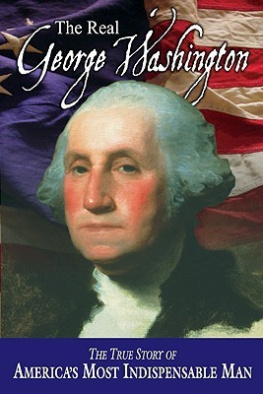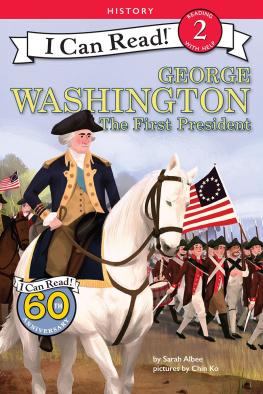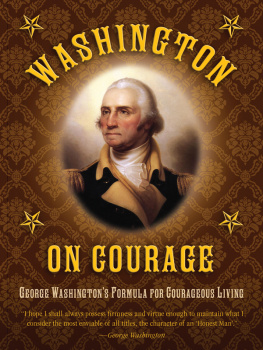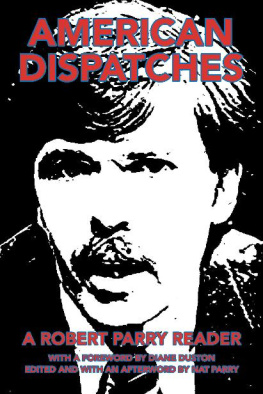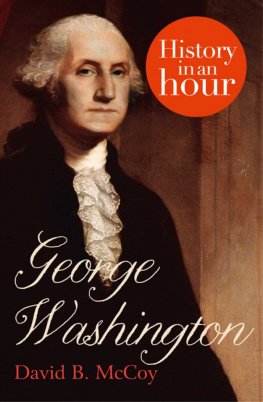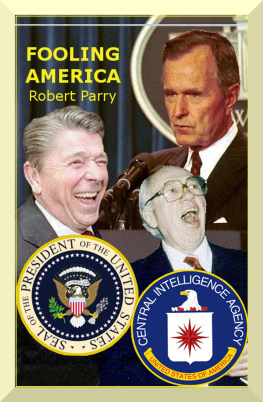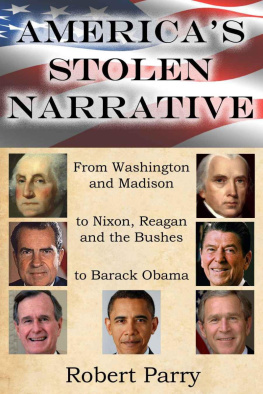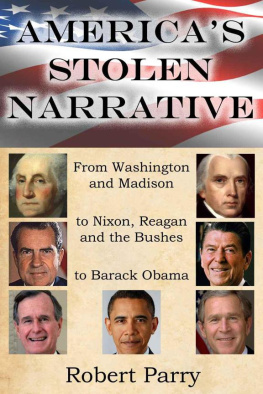
Table of Contents
Copyright 1991, 2008 by National Center for Constitutional Studies
Electronic Book Edition Copyright 2011 by National Center for Constitutional Studies
All rights reserved. No part of this book may be reproduced in any form or by any electronic or mechanical means including information storage and retrieval systems without permission in writing from the publisher, except by a reviewer who may quote brief passages in a review.
Library of Congress Cataloging-in-Publication Data
The Real George Washington (Vol. 3 of the American Classic Series)
Includes bibliographical references.
Contents: Part I. George Washington: The Man Who United America, by Jay A. Parry and Andrew M. Allison. Part II. Timeless Treasures from George Washington, prepared by Andrew M. Allison, Jay A. Parry, and W. Cleon Skousen.
Includes index.
1. Washington, George, 1732-1799. 2. PresidentsUnited StatesBiography. 3. GeneralsUnited StatesBiography 4. United StatesContinental ArmyBiography. 5. United StatesHistoryRevolution, 1775-1783Campaigns. 6. United StatesPolitics and government1789-1797. 7. United StatesPolitics and government1783-1789. I. Allison, Andrew M., 1949 . II. Washington, George, 1732-1799. Selections. 1991. III. Title. IV. Series: American Classic Series (National Center for Constitutional Studies (U.S.)); v.3. E312.P23 1991 973.41092dc20 90-5607 [B] CIP
ISBN 10: 0-88080-014-3 ISBN 13: 978-0-88080-014-3
Cover image courtesy of The Granger Collection, New York. Used with permission.
Printed in the United States of America
National Center for Constitutional Studies
(208) 645-2625
www.nccs.net
Volume 3 of the
American Classic Series
Part I
George Washington: The Man Who United America
(A History of His Life)
By Jay A. Parry
and
Andrew M. Allison
Part II
Timeless Treasures from George Washington
A compilation of the most important passages from Washington's writings, arranged alphabetically by subject matter
(Selections from His Writings)
Prepared by
Andrew M. Allison,
Jay A. Parry
and
W. Cleon Skousen
Preface
There is properly no history; only biography, wrote Ralph Waldo Emerson.
If that is true of the general run of mankind, it is particularly applicable to George Washington. The story of his life is the story of the founding of America. His was the dominant personality in three of the most critical events in that founding: the Revolutionary War, the Constitutional Convention, and the first national administration. Had he not served as Americas leader in those three events, all three would likely have failed. And America as we know it today would not exist.
Washingtons contributions were clear to his contemporaries. He was called The Father of His Country as early as 1779, in Francis Baileys Lancaster Almanac .
Francis Hopkinson, one of Washingtons military aides, wrote: To him the title of Excellency is applied with particular propriety. He is the best and greatest man the world ever knew. He retreats like a General, and attacks like a Hero. Had he lived in the days of idolatry, he had been worshipped as a God.
And Thomas Jefferson wrote in 1782, long before the Constitutional Convention and Washingtons presidency, [Washingtons] memory will be adored while liberty shall have votaries, whose name shall triumph over time, and will in future ages assume its just station among the most celebrated worthies of the world.
That high regard for Washingtonand fascination with his lifehas continued through the years, as reflected in the numerous studies done by both historians and journalists. A survey of the current Books in Print, which lists all available books from major publishers in the United States, reveals that more than one hundred studies of Washingtons life and place in history are presently in print. Added to that total are the many collections of Washingtons writings, which come in the aggregate to more than eighty volumes.
Washington has been scrutinized and analyzed from every direction. Authors and scholars have looked at his private life, his religious life, his skills as a farmer, his military accomplishments, his ability as President. Complete volumes have been devoted to subjects as diverse as Washingtons childhood, foreign policy, and role in forming the Constitution. Some researchers have written for very special interests, producing books on Washingtons chinaware, his involvement in Masonry, and the music in his family. Other volumes discuss Washington and money, Washington and the law, Washington and the theatre, Washington as an employer and importer of labor, and Washingtons pedigree.
Some have delighted in digging for dirty refuse in the rubble of history, seeking for ways to discredit our first President. Some have implied that Washington was improperly enamored of his best friends wife, Sally Fairfax. Others have claimed that General Washington padded his Revolutionary War expense account, enriching himself while his country suffered impending bankruptcy.
Washington could swear a violent blue streak, they say, Washington took pleasure in the charms at his slave quarters. Washington was stern, humorless, ice cold. Such are the claims of some authors who take more pains to seek (or manufacture) Washingtons foibles and failures than they take to learn who he really was.
In the face of the truth, such accusations turn to dust. As biographer James Thomas Flexner put it, Most of the brickbats now being thrown at Washington are figments of the modern imagination.
Who was the real George Washington? What was he really like? To find the answers to those questions, we have gone to the best source available, to the person who knew him best: Washington himself. Rather than analyze and dissect the man until nothing remains but faulty interpretations, we have told his story in simple terms, allowing him the privilege to present himself throughout.
The evidence leaves no doubt that Washington the man is entirely worthy of Washington the myth. Douglas Southall Freeman concluded the same after some nine years spent in researching and writing six volumes on Washingtons life. In an introduction to the sixth volume, Dumas Malone wrote: By the slow and painstaking processes of scholarship [Freeman] examined, verified, and preserved a major legend .
Some may have wondered then [during Washingtons life] and some may wonder now if the man could have been as irreproachable, as inflexibly just, as dedicated a patriot as he seemed to be. The verdict of the scrupulous historian after years of unremitting inquiry is that, as nearly as can be in human life, the legend and the man were identical.
Historian James Flexner, who wrote five volumes on Washingtons life, came to a similar conclusion. Washington, he wrote, truly was a great and good man. He added, In all history, few men who possessed unassailable power have used that power so gently and self-effacingly for what their best instincts told them was the welfare of their neighbors and all mankind.
In order to fully present both the life and thought of George Washington, we have divided this volume into two parts. Part I consists of the biography, and Part II contains selected quotations from Washingtons writings and speeches. Together they provide a more meaningful and more complete portrait of George Washington. In both sections the passages quoted from Washington are carefully documented from original sources. A number of the sources for Part I, which are found in the Notes and References section, are accompanied by further explanatory material and editorial comments.
Next page
